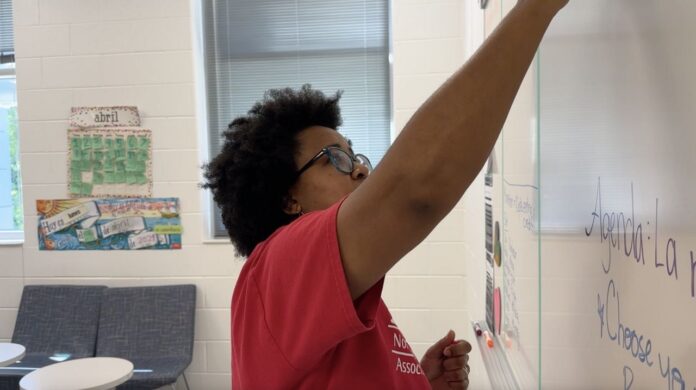RALEIGH, N.C. — The North Carolina General Assembly short session has started. The state’s budget office recently released preliminary numbers, showing an estimated $1.4 billion of unexpected revenue in the two-year budget.
So where’s all that money going to be spent? That’s something lawmakers could decide during this session.
As legislators make adjustments to the current two-year budget, many are wondering if that extra $1.4 billion could mean raises for state employees, including teachers. Districts across the state have felt a strain on staffing in schools and many educators, including one Durham high school teacher, believe a big reason for that is the pay.
“This is year 11 of teaching, and one of my favorite things is actually the unit that we’re currently doing, which is talking about daily routines,” said Ashley Smith, a Spanish teacher at Northern High School.
Having a passionate Spanish teacher is what inspired Smith to pursue a career in education, but the below-national-average pay is one of the only things that’s ever factored into her leaving.
“I had to look at another position so that I could pay for child care, so I left. I left back in 2015, and then I took a couple of years off and came back here to Durham,” Smith said.
She says she returned to teaching because her heart belongs in the classroom, but passion doesn’t pay the bills. Smith says she’s frustrated that deciding whether teachers should be paid more is even up for debate.
“I think it is a larger issue. It feels like that educators across the state and across the nation are under attack,” Smith said.
Smith believes that if teaching salaries aren’t addressed soon, the education system will be at a crossroads.
“If you were to ask most people who may be on the fence about whether they’re going to leave education or not, this is the make or break year. If they don’t make the decision to go ahead and give raises, then they’re going to see a mass exodus of people,” Smith said.
During the General Assembly’s short session, lawmakers could consider making adjustments to the state budget. Smith hopes the estimated $1.4 billion in leftover funding is spent wisely.
“Education is priority. It is the ultimate priority. These students, my children, are a part of the future of North Carolina and this nation,” she said. “If we do not invest in education, we’re going to put ourselves in a very serious spot in the next couple of years.”
The state budget, as it’s currently written, did provide a 3.6% to 10.8% raise for teachers over the two years. North Carolina teachers have seen raises from the state level, every year, for the past 10 years.
Additionally, lawmakers have said that if they allocate money in a budget toward a pay raise, they want to make sure that money is there in the future so that pay stays consistent. If they’re unsure that money will be there in the future, they may also consider a one-time bonus instead of an overall pay increase.
Other topics that will likely get attention during the session are medical marijuana, HOA law changes, Opportunity Scholarships as well as the SAVE Act, which is meant to allow nurse practitioners to provide health care in communities where there are medical shortages.



